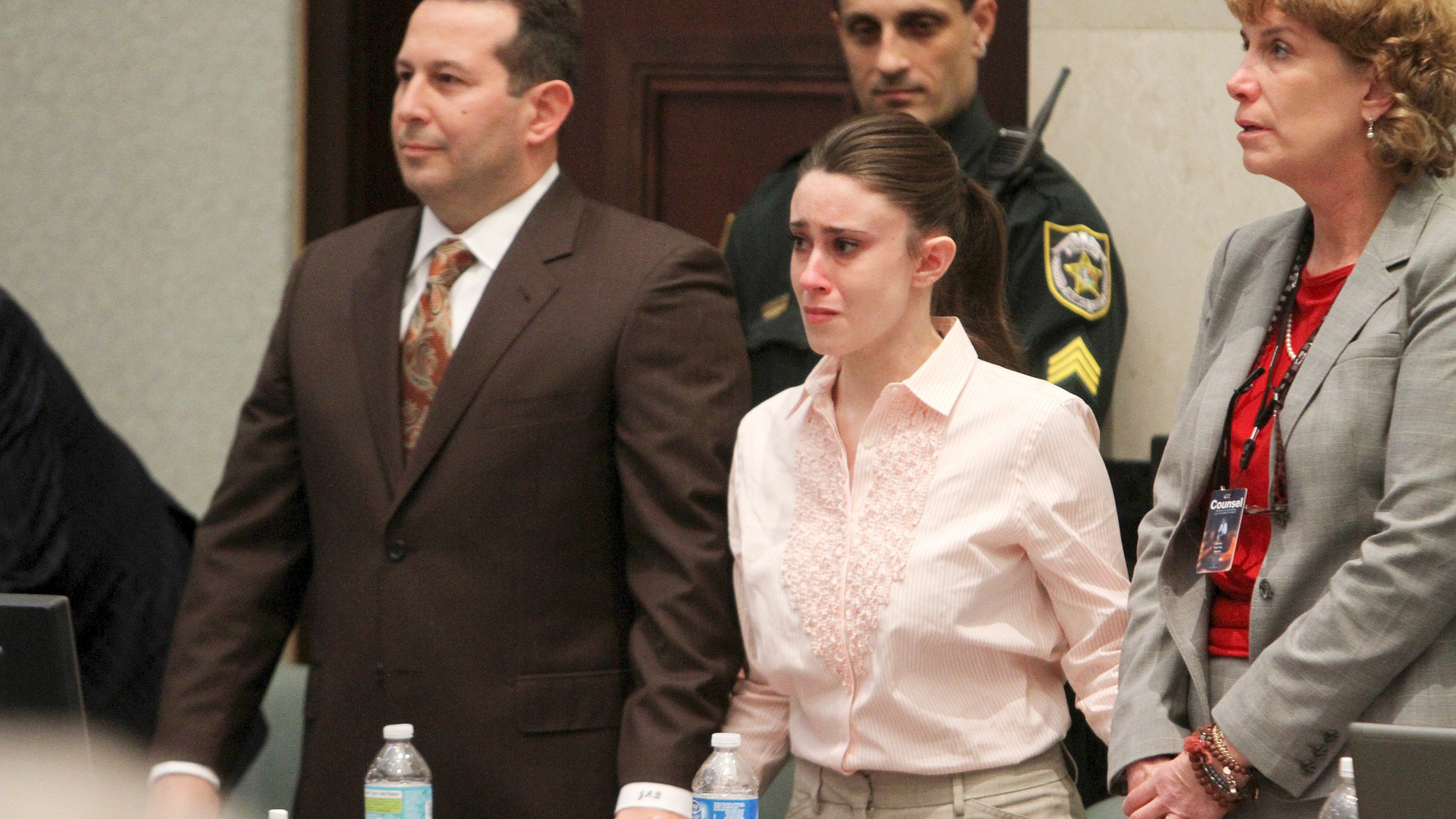The Tragic Disappearance of Caylee Anthony: A Beautiful Life or a Beautiful Lie? 2865c
It began with a smell. A smell so putrid and unmistakable that it quickly became the first clue in the mystery of the missing child. But the true horror of the situation was much more than that single, powerful scent. It was a mother’s silence. It was a lie that would shock the world.
The disappearance of two-year-old Caylee Anthony captured the world’s attention, but the more the story unfolded, the darker the truth became.
On June 15, 2008, Caylee Anthony was reported missing by her grandmother, Cindy Anthony, who had not seen her granddaughter for nearly a month. The family was in disbelief. Little Caylee, a bright, playful child, was gone, and no one knew why or where she was.
What followed was a whirlwind of confusion, heartbreak, and intense media coverage. As the search teams and law enforcement officials scoured the area, desperately trying to piece together what had happened to Caylee, her mother, Casey Anthony, remained strangely uncooperative.
She gave conflicting stories, and her behavior raised more questions than answers.

For 31 days, no one outside the Anthony family knew that Caylee had gone missing. While her mother, Casey, gave interviews and her family worked tirelessly to find her, Casey herself appeared strangely detached from the situation.
During this critical time, Casey was not at home searching for her daughter. Instead, she was out partying, attending social gatherings, and even posing for photos. She seemed oblivious to the gravity of the situation.
One of the most chilling revelations was that, on the day Caylee was reported missing, Casey had gotten a tattoo that read "Bella Vita," or "Beautiful Life" in Italian. The irony was not lost on the public. Here was a mother whose daughter had vanished, and yet she seemed more concerned with partying and enjoying life than with finding her missing child.
As the investigation continued, law enforcement began to uncover details that only deepened the mystery. A search of Casey’s car revealed the smell of death, and a forensic investigation revealed traces of human remains in the trunk. Yet, despite this grim discovery, there was no immediate breakthrough in the case.
The evidence seemed to point in one direction, but Casey continued to deny any involvement in her daughter’s disappearance. She clung to her story, refusing to tell investigators what really happened. As the days dragged on, the hope of finding Caylee alive began to dwindle.

Finally, on December 11, 2008, after months of searching, Caylee’s remains were discovered by a utility worker just a short distance from the Anthony family home.
The remains were found in a wooded area near a nearby suburban neighborhood. For the world, the discovery confirmed the worst fears: Caylee Anthony was dead. Her family’s worst nightmare had become a tragic reality.
The case, however, was far from over. The discovery of Caylee’s remains sparked a media frenzy, and the entire nation seemed to be consumed with the question of who was responsible for this innocent child’s death.
Everyone wanted justice, and Casey Anthony quickly became the center of the investigation.
The story of her behavior during the days after Caylee’s disappearance only fueled suspicions. She had lied to police about where her daughter had been, and her actions and demeanor suggested something far darker than what she was admitting.

In 2011, Casey Anthony was put on trial for the murder of her daughter. The prosecution presented a case that seemed straightforward: Casey had killed her daughter, then disposed of her body in the woods, and spent the following month lying about what had happened.
The evidence pointed to Casey as the primary suspect. The prosecution argued that Casey had been more concerned with her own life and image than with her daughter’s well-being. The tattoo, the partying, the lies — all seemed to be part of a pattern that suggested Casey had something to hide.
However, the defense team painted a different picture. They argued that there was no direct evidence to link Casey to her daughter’s death. While the prosecution had circumstantial evidence, such as the smell of death in the car and the discovery of remains in the woods, there was no definitive proof that Casey had intentionally harmed her daughter. The defense team suggested that Caylee’s death could have been an accident, and they questioned the credibility of the evidence that had been presented. The prosecution's case faltered under cross-examination, and doubts began to creep in.
In the end, the jury found Casey Anthony not guilty of murder. She was convicted of lying to law enforcement but acquitted of the more serious charges. The verdict sparked outrage across the country.
Many believed that the justice system had failed Caylee. The public felt that a mother who had acted so callously, who had lied to the authorities and shown no remorse, should have been held accountable for her daughter’s death. Yet, without enough hard evidence to prove her guilt beyond a reasonable doubt, Casey was set free.
To this day, the question remains: was it a Beautiful Life, or was it a Beautiful Lie? Did Casey Anthony kill her daughter, or was she merely a mother who lost her child under tragic and unexplained circumstances? The world may never know the full truth of what happened that fateful day, but what remains clear is that Caylee’s life was taken far too soon. A bright, innocent child who deserved a lifetime of love and joy was gone, and the unanswered questions surrounding her death continue to haunt the public.

For Caylee’s family, the pain of losing her will never go away. For everyone who followed the case, the memory of the missing child, the lies, and the tragic discovery will linger. While justice may have been elusive, Caylee’s memory will continue to live on, a reminder of the importance of protecting the most vulnerable among us and the need for justice, truth, and accountability.
In the end, the world will remember Caylee Anthony not for the mystery surrounding her death, but for the life she lived — a life filled with love, promise, and innocence that was stolen far too soon. May she rest in peace. 🕊
Titus’s Goodbye: The Little Hero Whose Light Will Never Fade 1330

There are some goodbyes no parent should ever have to say. For Titus’s family, that moment arrived too soon, leaving them with memories etched in both heartbreak and love. Just yesterday, they wrapped their sweet boy in the warmth of his favorite blankets, gave him a gentle bath with the soap he adored, and put on a Spider-Man movie—the one that never failed to make him laugh, even as exhaustion pressed down on his small body. It was their way of giving him comfort, of trying to bring the feeling of home into a place filled with hospital walls and monitors. For a few precious hours, they succeeded.
Tomorrow was supposed to bring clarity, answers, maybe even hope. A CT scan had been scheduled, a step in the endless cycle of searching for what could be done next. But instead of answers, tomorrow delivered the unthinkable: the hardest goodbye a parent can face. Titus, their warrior, their joy, their light, fought until the very last moment. His little body had carried him through countless battles, but at the end, it grew too tired. And yet, in his final act of strength, he opened his eyes one last time, gifting his family with a goodbye they will never forget.

Now Titus is free. Free from wires, from pain, from the weight of treatments and procedures that no child should ever endure. His laughter, once muffled by fatigue, now lives in memory as brightly as ever. His courage, once wrapped in a fragile frame, now stands eternal. What remains is love—pure, unbreakable love—that will live forever in the hearts of those who knew him.
Titus’s journey was never defined solely by illness. It was defined by the way he lived despite it. Even as treatments robbed him of strength, he found ways to smile. Even as exhaustion claimed his days, he found moments to laugh. His spirit never bowed to the weight of what he carried. He became a reminder of what courage truly looks like—not in grand gestures, but in the quiet bravery of choosing joy in the face of suffering.
His parents will forever remember the small details: the feel of his favorite blanket against his skin, the sound of his laughter during a Spider-Man scene, the way his eyes, even in his final moments, sought theirs with love. These details, ordinary to an outsider, are sacred now—touchstones of a boy who lived fully, even in a life far too short.
But Titus’s story doesn’t end with goodbye. His life, though brief, holds a legacy that stretches beyond the hospital room, beyond his family’s home, beyond even the grief of his passing. It continues in every heart he touched, in every person inspired by his courage. His laughter lingers in the memories of friends and family. His resilience strengthens those still in their own battles. His light encourages acts of kindness, compassion, and love in a world that desperately needs them.

To lose a child is to lose a piece of your own soul. Titus’s family now faces nights without his laughter, mornings without his presence, and days that feel heavier for his absence. Yet even through their grief, they know his life mattered. He was not just their son—he was their teacher, showing them what it means to live with courage. He was their hero, proving that strength has nothing to do with size or age. He was their miracle, reminding them that love, once given, never dies.
For those who hear his story, Titus leaves a lesson: life is fragile, but love is eternal. The way he fought, the way he smiled, the way he said goodbye—these are reminders of how precious every moment is. His family’s heartbreak is unimaginable, but so too is the gift of having known him, loved him, and been loved by him.
As his parents look to the days ahead, they know the pain will not fade quickly. Grief will come in waves—sometimes gentle, sometimes crushing. But alongside the grief will be gratitude: gratitude for his laughter, for his courage, for the moments of joy he gave them even in the hardest of days. Titus will never be just a memory; he will always be a part of who they are.
And so his story continues. Not in the hospital rooms he left behind, not in the sorrow of his final breath, but in the countless acts of love and kindness that his life inspires. Each time someone chooses compassion, each time someone chooses to live with courage, Titus’s light shines again. His legacy is not one of loss, but of love—a love that will never fade.

Titus may have taken his final breath, but his story lives on. In the hearts of his parents. In the smiles of those who knew him. In the kindness of strangers moved by his courage. His journey reminds us all to hold our loved ones closer, to treasure the ordinary moments, and to live with the kind of love that outlasts everything.
Now Titus is free. Free to rest, free to shine, free to live forever in the memories of those who loved him. And for as long as stories are told, as long as love is shared, the little hero named Titus will never truly be gone.





